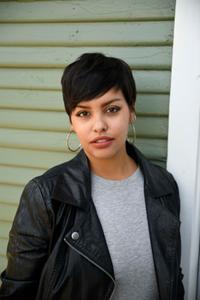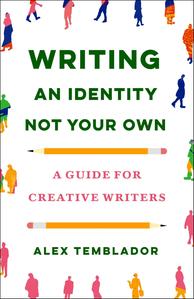
|
|
| Alex Temblador (photo: Shelbie Monkres) |
|
Alex Temblador is the award-winning author of the novels Half Outlaw and Secrets of the Casa Rosada. She is a journalist and DEI expert whose latest book, Writing an Identity Not Your Own (St. Martin's Essentials; reviewed in this issue), is a practical guide to help authors authentically write and edit a character whose identity is different than their own.
You come to this book both as a writer and a teacher; how might a book like this one have changed your own outlook when you were starting to write?
I didn't approach characterization in this way at all. I was just kind of flailing about and thought, well, I'm just writing characters who are like me or like people I know. But that doesn't mean that they don't have different identities than me. I don't want to say I wouldn't have tried things I did try and have regretted since. But maybe I would have been more mindful about how I tried them. I would have gut feelings why it wasn't working; I wish I would have been able to name the stuff that was going wrong, name my biases, recognize how I could build characters in different ways, and think about their identities in relation to every part of the story.
What I have found in writing the book is that I think it would be helpful if we rethink how we build characters. I think a lot of us just go at it with gut feeling and intuition. And I'm all for that, but we actually don't always teach how to build characters and how to think about all their identities.
Why do you think it's important for writers of any level or ability to think about these big questions of bias and representation across their work?
I think beginner writers are looking for guidance. If we can get writers to start thinking about this at the beginning of their writing journey, I'm hoping over time it builds up and it becomes a practice.
In terms of writers who are already established, we've not been challenged to reflect on the way that we have presented identity. I think yes, there has been a little bit of pushback with social media in terms of people questioning, "Why did you write that identity?" Like, "Did you do it well?" Or, "Just saying, we don't think you did it well." But authors and writers haven't actually spent a lot of time asking, "What am I not doing well?" So, I'm hoping that people who are already established are going to be able to look at this and reconsider how they've built characters before, how they've talked about other communities.
 How do you keep yourself from being overwhelmed with the continual learning process?
How do you keep yourself from being overwhelmed with the continual learning process?
I say this in the book: you're going to make mistakes. I made mistakes writing this book, and I know that because I'm recording the audiobook right now, and I'm like, oh, that's a little change I want to make. If I'm going to be a writer and I'm going to ask people to accept the fact that they make mistakes, that I also have to accept that fact. I also know that I am 34 years old, so there's no way that I have unpacked all of my biases. That's a lifetime commitment. So I have to expect that it's going to be in my writing practice, too.
I have to be diligent. I have to be mindful. I have to continue my self-education. And I hope when readers get this book, they realize that if you're going to take this on, that's something you're going to have to do as well.
Do you have a favorite writing exercise?
The one in chapter four, where it's basically building the character out. I don't even use half this stuff in the work that I write, but if I know that they lived in an apartment and now they live in a mansion, that's going to impact my character's perception of the world. I tend to find that when I'm writing, fiction especially, I can't get to the end unless I know what drives my character, and usually what drives them are their fears and their joys. To build them out, I need to know their quirks, their hobbies, their relationships. So that exercise is my favorite. Sometimes I'll write half a book, and then I'm like, okay, I should have done this at the beginning. Let me go back and do this because it's going to help me to push the book forward and showcase who they are.
Do you think that writing this book has had an impact on your own writing process?
Since writing this book, I needed a lot of time off. I needed some space to think about what I wanted to write and how I wanted to continue in my career as a fiction writer. I am going a little slower, which is nice. I'm being more mindful, and I can see my mind working as I'm writing.
I would probably say that if people pick this up, and they've never thought about this before, they're going to do better in the editing phase. It might take a little time for you to recognize what you're doing while you're writing because you get so much in the zone. So, I do like that it makes me slow down. Since writing this book, I have told myself I want to see if I can create something very magical, and joyful, and happy, and focus on those aspects of writing my own identity and some different identities as well. I'm being more intentional now than intuitive. I think that's going to be good, or at least I'm going to learn something from doing it this way.
If you could have your readers take two things from your book, what would they be?
I'm thinking about something I said at the end of the book: it is okay to write other identities. It's okay to experiment, it is okay to write something and put all your heart in it. It is also okay to let something die. It's also okay to admit that this isn't ready, or it should never be published. Or never be shared. Because it's okay not to share things with the world, if it's just not ready. That's probably one of the big things, because I don't think we need to continue to do harm to historically marginalized identities.
The other thing I would say, and maybe this goes a little bit against what I said earlier, but editing is where it's at. It's great if you recognize your mistakes or your biases while you're writing. But you can actually do a ton of work in the editing process. It's my favorite part--the writing is hard to get through; the editing is the best because you get to shape your story, but you also get to catch everything that you missed. It's where other people are able to help you catch things you missed. And I hope that people take advantage of other people's perspectives. Ask for feedback, ask for that community help. I don't think we're going to get through this change in the industry or in creative writing without all of us working together as a community to give each other checks and balances. If you make a mistake, admit you made a mistake. Be very open and honest about it and do everything you can to fix it. That's definitely a big thing I would have people take away from it. --Michelle Anya Anjirbag

